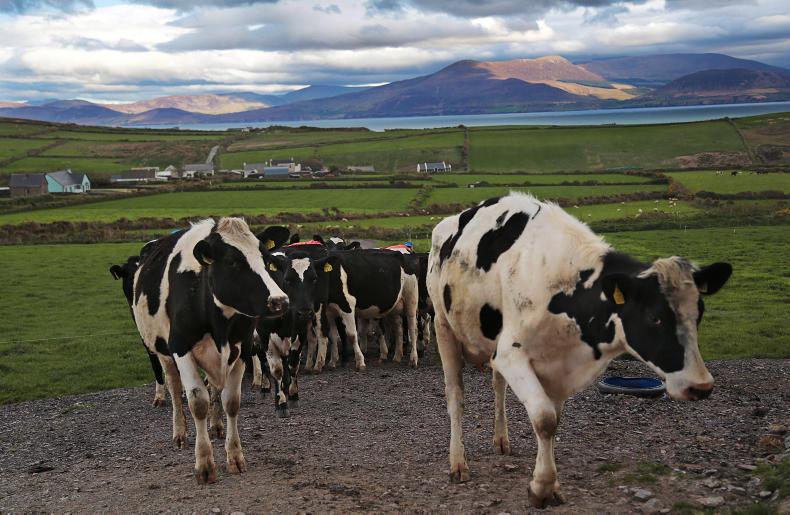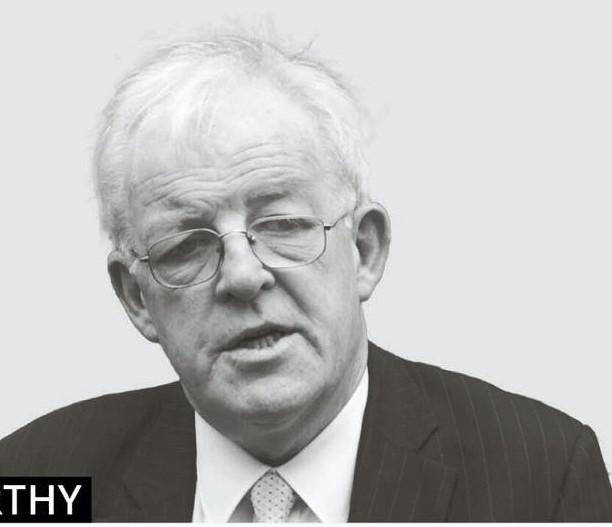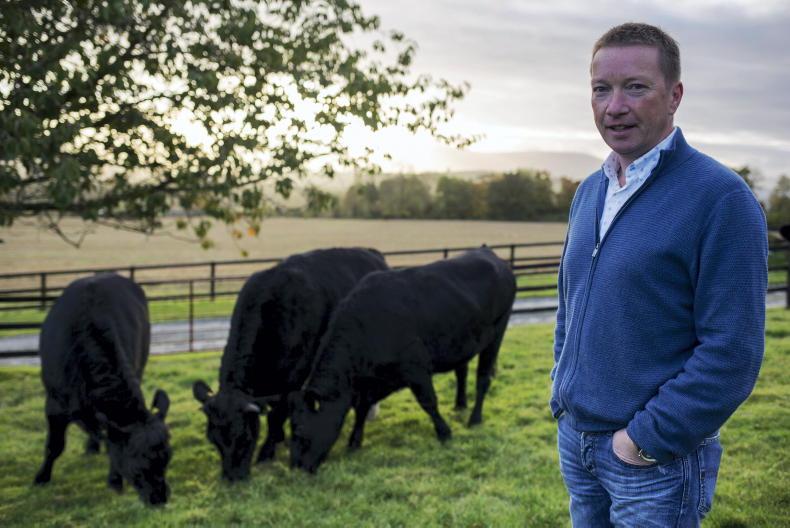If you bought a sandwich at a filling station, according to former Taoiseach John Bruton, “the likelihood is that the bread may have been produced in England, the butter in the Republic of Ireland and the filling from Northern Ireland”.
His comments, which highlight the complexity of Brexit for Ireland’s agri-food economy, are included in a report published last week by the House of Lords EU committee. The report concluded that any potential negative impact of Brexit will probably be more significant for Ireland than for any other member state.
It also highlighted that it would be more significant if there was any economic downturn in the UK or if tariffs or other barriers to trade were introduced between the UK and the EU.
The report specifically separated the agri-food sector and its associated downstream processing and manufacturing businesses. It said these would appear most likely to be the worst affected, given the reliance on UK exports. It also emphasised the potential negative knock-on effects on the communities that rely on these industries.
Arguably the greatest economic and social challenge for this island in 50 years
The Economic and Social Research Institute (ESRI) has suggested that the negative impact of Brexit on Ireland’s GDP would be “somewhere between 2% and 4%”. While Teagasc has projected annual losses of up to €800m in agri-food export value as a result.
No real surprises there. However, what is interesting about the 80-page report is that it concludes that Brexit could negatively affect the economy of another country from where it gets the majority of its food.
Perhaps this highlights the UK’s chief concern – food security. After all, it needs to import 40% of its food to feed its people and Ireland supplies the largest slice of this.
Some 33 expert witnesses provided oral evidence to the committee on the impact of Brexit to the Irish economy. Significantly, two former Taoisigh, Bertie Ahern and John Bruton, once bitter rivals, sat side by side and contributed their views.
While Taoiseach Enda Kenny has described the UK’s vote to withdraw from the EU as “arguably the greatest economic and social challenge for this island in 50 years”, there are few answers around the negative consequences it may have for Irish farmers and rural Ireland.
The halo of the M50
To those inside the M50, the agri-food and drink sector might only account for 12% of exports, less than 9% of total employment and less than 8% of gross value added, but outside the halo effect of the M50, it powers Ireland’s rural economy, supports more than 100,000 farms, is Ireland’s largest indigenous sector and provides a multiplier of 1.5 on the wider economy.
The Irish Department of Finance analysis estimates that if Ireland’s agri-food sector was to suffer a demand shock of €1m, an additional €500,000 shock would hit the wider economy.
And certain sectors look set to fare worse depending on their exposure to the UK market.
Despite 42% of Irish agri-food and drink exports going to the UK, 50% of our beef exports, 60% of our cheese exports and 90% of our mushroom exports ends up on supermarket shelves in the UK.
Migrant chickens and immigrant lambs
Ireland is the fifth-largest market for UK goods overall and the largest for Northern Ireland’s exports. Almost 5% of total UK exports (worth £28bn) went to Ireland in 2014, while 3% of UK imports (worth £17bn) came from Ireland.
That means that £45bn is traded between the two countries each year.
Some 52% of Northern Ireland exports goes to the EU, including 38% to Ireland. Ireland also accounts for 70% of the £1.1bn food and drinks exported to the EU from Northern Ireland.
Then there is the interconnected supply chain between the North and south, where 30% of the milk produced in the North was processed south of the border, while 40% of the chicken produced in the south was processed north of the border.
Furthermore, last year, 350,000 lambs went south, 500,000 pigs went north and 750m litres of milk went south for processing.
It doesn’t take too many PhDs to figure out that any restrictions on cross-border trade could have a significant affect on the sector.
Despite the First Minister and the Secretary of State for Northern Ireland perceiving opportunities for Northern Ireland outside the EU, the report concludes that the risks to the Northern Ireland economy posed by Brexit probably outweigh the opportunities.
Listen to “Minister Creed at all-Ireland Brexit forum” on Spreaker.
Tariffs could wipe out profits
Much of the talk about the impact of Brexit thus far has been around the depreciation of sterling (by up to 20%) and its impact on the beef and mushroom sectors, which has wiped out traditionally wafer thin profit margins. What then would happen if tariffs were introduced?
If the UK moved to trading with EU countries on World Trade Organisation (WTO) terms, tariffs of 7% to 65% could be placed on agricultural products.
With average net margins of less than 3% in the agri-food sector, this could make many agribusinesses loss-making overnight.
Then there is the threat that the UK could pursue a cheap food policy – pricing producers on both sides of the border out of the market.
Economist Dan O’Brien has suggested that future UK trade deals that reduced tariffs on beef and dairy from Latin America and New Zealand could “decimate” Ireland’s agri-food sector.
Irish producers would have to find new homes for cheddar cheese, minced beef and chicken breasts further afield. Not an easy task and one where only a cheaper price will displace a Dutch pork chop or French chicken breast off a supermarket shelf.
The notion that all the industry needs to do is diversify away from the UK market is a fantasy.
The UK still remains one of the most lucrative markets in the EU, with higher prices than continental Europe.
Coupled with such uncertainty over how the UK, and hence Ireland, plans to mitigate any negative impact of Brexit, it becomes extremely important for both Northern Ireland and the Republic of Ireland to find an agreement which takes into account the all-island nature of our agri-food economies.
Read more
€1bn Brexit damage to agri-food exports, warns economist
Full coverage: Brexit
If you bought a sandwich at a filling station, according to former Taoiseach John Bruton, “the likelihood is that the bread may have been produced in England, the butter in the Republic of Ireland and the filling from Northern Ireland”.
His comments, which highlight the complexity of Brexit for Ireland’s agri-food economy, are included in a report published last week by the House of Lords EU committee. The report concluded that any potential negative impact of Brexit will probably be more significant for Ireland than for any other member state.
It also highlighted that it would be more significant if there was any economic downturn in the UK or if tariffs or other barriers to trade were introduced between the UK and the EU.
The report specifically separated the agri-food sector and its associated downstream processing and manufacturing businesses. It said these would appear most likely to be the worst affected, given the reliance on UK exports. It also emphasised the potential negative knock-on effects on the communities that rely on these industries.
Arguably the greatest economic and social challenge for this island in 50 years
The Economic and Social Research Institute (ESRI) has suggested that the negative impact of Brexit on Ireland’s GDP would be “somewhere between 2% and 4%”. While Teagasc has projected annual losses of up to €800m in agri-food export value as a result.
No real surprises there. However, what is interesting about the 80-page report is that it concludes that Brexit could negatively affect the economy of another country from where it gets the majority of its food.
Perhaps this highlights the UK’s chief concern – food security. After all, it needs to import 40% of its food to feed its people and Ireland supplies the largest slice of this.
Some 33 expert witnesses provided oral evidence to the committee on the impact of Brexit to the Irish economy. Significantly, two former Taoisigh, Bertie Ahern and John Bruton, once bitter rivals, sat side by side and contributed their views.
While Taoiseach Enda Kenny has described the UK’s vote to withdraw from the EU as “arguably the greatest economic and social challenge for this island in 50 years”, there are few answers around the negative consequences it may have for Irish farmers and rural Ireland.
The halo of the M50
To those inside the M50, the agri-food and drink sector might only account for 12% of exports, less than 9% of total employment and less than 8% of gross value added, but outside the halo effect of the M50, it powers Ireland’s rural economy, supports more than 100,000 farms, is Ireland’s largest indigenous sector and provides a multiplier of 1.5 on the wider economy.
The Irish Department of Finance analysis estimates that if Ireland’s agri-food sector was to suffer a demand shock of €1m, an additional €500,000 shock would hit the wider economy.
And certain sectors look set to fare worse depending on their exposure to the UK market.
Despite 42% of Irish agri-food and drink exports going to the UK, 50% of our beef exports, 60% of our cheese exports and 90% of our mushroom exports ends up on supermarket shelves in the UK.
Migrant chickens and immigrant lambs
Ireland is the fifth-largest market for UK goods overall and the largest for Northern Ireland’s exports. Almost 5% of total UK exports (worth £28bn) went to Ireland in 2014, while 3% of UK imports (worth £17bn) came from Ireland.
That means that £45bn is traded between the two countries each year.
Some 52% of Northern Ireland exports goes to the EU, including 38% to Ireland. Ireland also accounts for 70% of the £1.1bn food and drinks exported to the EU from Northern Ireland.
Then there is the interconnected supply chain between the North and south, where 30% of the milk produced in the North was processed south of the border, while 40% of the chicken produced in the south was processed north of the border.
Furthermore, last year, 350,000 lambs went south, 500,000 pigs went north and 750m litres of milk went south for processing.
It doesn’t take too many PhDs to figure out that any restrictions on cross-border trade could have a significant affect on the sector.
Despite the First Minister and the Secretary of State for Northern Ireland perceiving opportunities for Northern Ireland outside the EU, the report concludes that the risks to the Northern Ireland economy posed by Brexit probably outweigh the opportunities.
Listen to “Minister Creed at all-Ireland Brexit forum” on Spreaker.
Tariffs could wipe out profits
Much of the talk about the impact of Brexit thus far has been around the depreciation of sterling (by up to 20%) and its impact on the beef and mushroom sectors, which has wiped out traditionally wafer thin profit margins. What then would happen if tariffs were introduced?
If the UK moved to trading with EU countries on World Trade Organisation (WTO) terms, tariffs of 7% to 65% could be placed on agricultural products.
With average net margins of less than 3% in the agri-food sector, this could make many agribusinesses loss-making overnight.
Then there is the threat that the UK could pursue a cheap food policy – pricing producers on both sides of the border out of the market.
Economist Dan O’Brien has suggested that future UK trade deals that reduced tariffs on beef and dairy from Latin America and New Zealand could “decimate” Ireland’s agri-food sector.
Irish producers would have to find new homes for cheddar cheese, minced beef and chicken breasts further afield. Not an easy task and one where only a cheaper price will displace a Dutch pork chop or French chicken breast off a supermarket shelf.
The notion that all the industry needs to do is diversify away from the UK market is a fantasy.
The UK still remains one of the most lucrative markets in the EU, with higher prices than continental Europe.
Coupled with such uncertainty over how the UK, and hence Ireland, plans to mitigate any negative impact of Brexit, it becomes extremely important for both Northern Ireland and the Republic of Ireland to find an agreement which takes into account the all-island nature of our agri-food economies.
Read more
€1bn Brexit damage to agri-food exports, warns economist
Full coverage: Brexit










SHARING OPTIONS